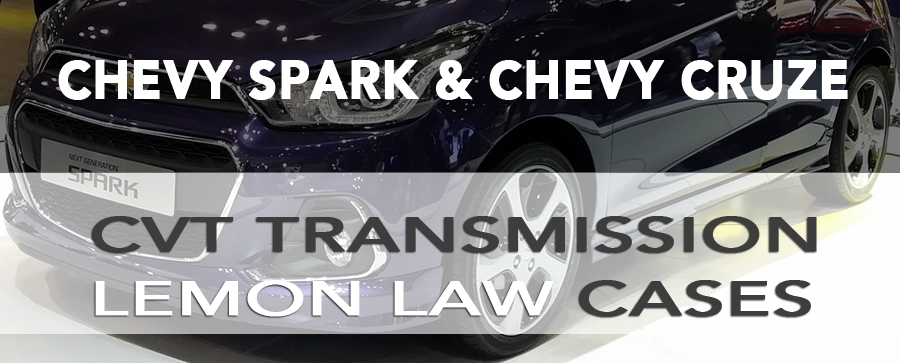Last Updated: October 2021

Owners of the Chevy Spark, model year 2016, and Chevy Cruze, are experiencing much the same transmission problems as owners of other makes and models with the CVT transmission such as the Nissan Sentra.
Common Chevy Spark and Cruze complaints include, but are not limited to:
- Hesitation when attempting to accelerate from a stopped position
- Check engine light comes on
- Engine stalls out
- Engine shakes
- Rough start or hard shift and sudden acceleration
- Engine shuts off while in park
When it comes to seeking a remedy for the transmission problems with your Chevy Spark or Chevrolet Cruze , GM’s preferred process of settlement is the BBB arbitration process. Dealerships typically ask consumers to agree to arbitration in a stand-alone agreement or as part of the retail installment sales contract signed in the F&I (Finance and Insurance) office. The arbitration clause is usually buried somewhere on the backside of the contract.
GM may require a consumer to go through arbitration before they file a lawsuit under the California Lemon Law. However, the California Lemon Law does not require the consumer to participate in arbitration in order to pursue a Lemon Law claim. Furthermore, a consumer is not bound by the decision of the arbitrator, unless the consumer agrees to be bound.
Unfortunately, there is a downside to arbitration because a consumer can end up receiving LESS than the California Lemon Law allows for! This is just one way in which arbitration favors the automobile manufacturers. Another advantage for automobile manufacturers is that an arbitrator is not required to apply the law the way a court would and the consumer could be stuck in arbitration for years. Lastly, the arbitrators are paid by the automobile manufacturers so how neutral are they really?
Know your rights and the remedies to which you are entitled.
The inherent problems with the BBB arbitration rules show that you should be careful going into a BBB arbitration without at least speaking to us first.
Lemon Laws, Warranty Laws and Arbitration are very complex topics, so it would be in your best interest go give us a call to find out whether or not you have a lemon law case and whether or not you are required to go through arbitration before you file a lawsuit. It will be during our free consultation that we will be able to offer the best course of action for you to take.
Gather your records.
The best evidence in making a lemon law claim in California is the repair order and subsequent repair invoice provided to you by the dealership. When you take your car into the dealership for a warranty repair, make sure that:
- your service advisor accurately records your complaints on the repair order;
- you do not leave the dealership without a copy of the repair order;
- after the repairs have been performed, make sure that the repair invoice actually states what was repaired on your vehicle or what parts were ordered;
- you do not sign the repair order until you have read it and you have made sure that what is written on the repair invoice actually matches with what your service advisor told you, and;
- never leave the dealership without a final closed out copy of your repair invoice.
Give us a call at 1-855-595-3666
You may have a lemon law case whether the repair visits have solved the problems or not.
